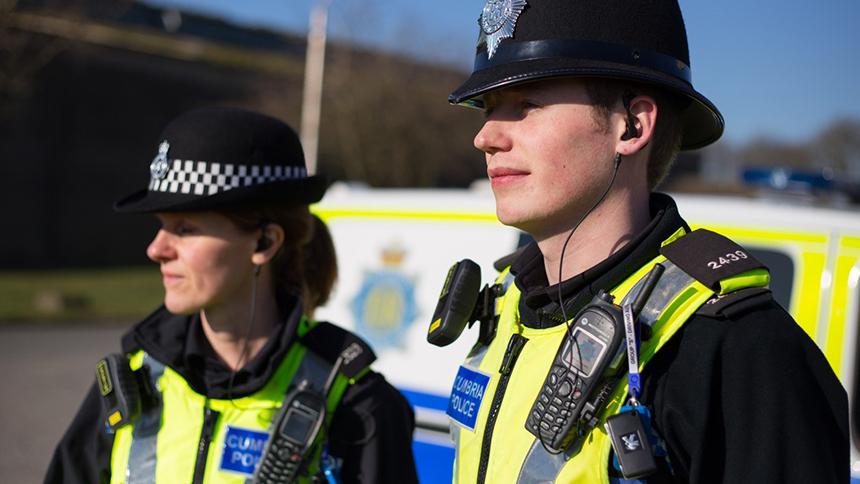Smarter policing: Reducing unnecessary call-outs
We report on a project that's training police to better support people with dementia.
 Police have received training to help them better communicate with a person with dementia
Police have received training to help them better communicate with a person with dementia
If a person with dementia has gone missing or is in a state of confusion or distress, the police might be called even if no crime has taken place.
Even with the best intentions, this could sometimes make the situation worse.
To address this, a social enterprise called Dignity in Dementia launched a project in Cumbria to reduce and prevent such call-outs. It has also trained police officers in how best to handle situations when they are called out.
Stressful
‘A family carer told us about her experience when her mother had gone missing,’ says Lesley Gill, co-founder of Dignity in Dementia. ‘It wasn’t especially positive, as the police inadvertently made the situation more stressful for them both
‘A community sergeant then told us that police officers didn’t have much knowledge of dementia and could indeed sometimes make situations more complicated and protracted.’
Dignity in Dementia started running training sessions at police stations across Cumbria to help officers, as well as command and control room staff, better understand dementia and how to communicate with someone who has the condition.
'Say their name loudly but in a really friendly way, and ask for their help with something they enjoy or know about,' says Lesley.
This included advice on how to search for a missing person.
‘We explained that it is better not to shout their name in a frantic manner, as this is likely to confuse and scare them more,’ says Lesley. ‘Say their name loudly but in a really friendly way, and ask for their help with something they enjoy or know about.’
Cumbria’s Police and Crime Commissioner, Peter McCall, attended one of the sessions.
‘It offered some really practical guidance to enable frontline staff to deal more effectively with people with dementia in crisis,’ he says.
Inspector Mike James, who has worked closely with the Dignity in Dementia team, thought the training was excellent.
‘Officers with many years’ service were describing it as the best input they’d ever had,’ he says.
Successful strategies
Officers called out to a person with dementia could also offer the family a referral to Dignity in Dementia.
Dignity in Dementia would visit and look into the person’s history to see what could be triggering the behaviour that led to the police involvement. They would also suggest how to reduce or prevent it.
Linda Mason’s mum, Cecily, was diagnosed with vascular dementia in 2012.
Cecily lives alone and, as her dementia progressed, would mistakenly accuse visiting family members or care staff of stealing from her. On one occasion she called the police to report a missing bank card, which led to a visit from an officer.
‘Thankfully he was very understanding and kind – he certainly appeared to understand about dementia,’ says Linda.
At the suggestion of Dignity in Dementia, the family placed a whiteboard in Cecily’s bungalow that reads, ‘Mum don’t worry about your bank card, I’ve got it and will bring it back with me when I visit later, love Linda.’
'It worked,’ says Linda. ‘Mum doesn’t ask about her bank card anymore and hasn’t phoned the police again.
‘We also understand much more about why she may behave in a certain way when she is anxious, unsure or upset. We try really hard to keep her on an even keel and work hard at trying to be more patient.’
Positive relationships
Another person supported by the project is Flo Jamieson, 86, who was diagnosed with Alzheimer’s in 2013. Having gone looking for her childhood home, she was found by a member of the public, who phoned the police.
‘The officer was wonderful and seemed to understand dementia really well, building up a positive relationship with Flo,’ says Christine.
Flo’s daughter-in-law Christine is full of praise for the attending officer who waited with Flo until the family arrived.
‘She was wonderful and seemed to understand dementia really well, building up a positive relationship with Flo,’ says Christine.
A visit from Dignity in Dementia again proved valuable.
‘Lesley asked lots of questions about Flo to build up a picture of her life,’ says Christine.
‘As a family we had already discussed different ways to prevent Flo from wandering off again, so I was able to share our thoughts with Lesley and gain advice.
‘We have now tried new things to encourage Flo to feel that she is still needed around the house, as we believe that if she feels useful then she’s less likely to feel the need to make her way back to her childhood home.’
 Police call-outs involving a person with dementia can be needlessly stressful
Police call-outs involving a person with dementia can be needlessly stressful
Achieving change
The project has led to a reduction in police call-outs, while those who do attend are now much more prepared.
‘Officers are better equipped to deal with situations involving people with dementia and avoid them escalating.’ says Peter.
Mike has also noted additional benefits for colleagues.
‘Sometimes it’s difficult for police officers to walk away and simply stop thinking about a person’s situation, so it helps to know that someone else is going to carry on the work,’ he says.
The project has clearly bought about positive change for all involved.
As Christine concludes, ‘The GP will prescribe drugs, the mental health team will assess the person and there are some good local activity groups to stimulate people with dementia.
‘However, actually having Dignity in Dementia, who understand and can help and advise us with the daily struggle of caring for someone with dementia, is priceless.’
Next steps
-
Get more information about Dignity in Dementia and related resources.
-
Find out about training and consultancy offered by Alzheimer's Society.


Jacqueline Parkes
saysIs it possible to be put in contact with the project team for this piece of work as we are developing similar work in Leicestershire and Northamptonshire, and we would like to link up with this project.
Thank you